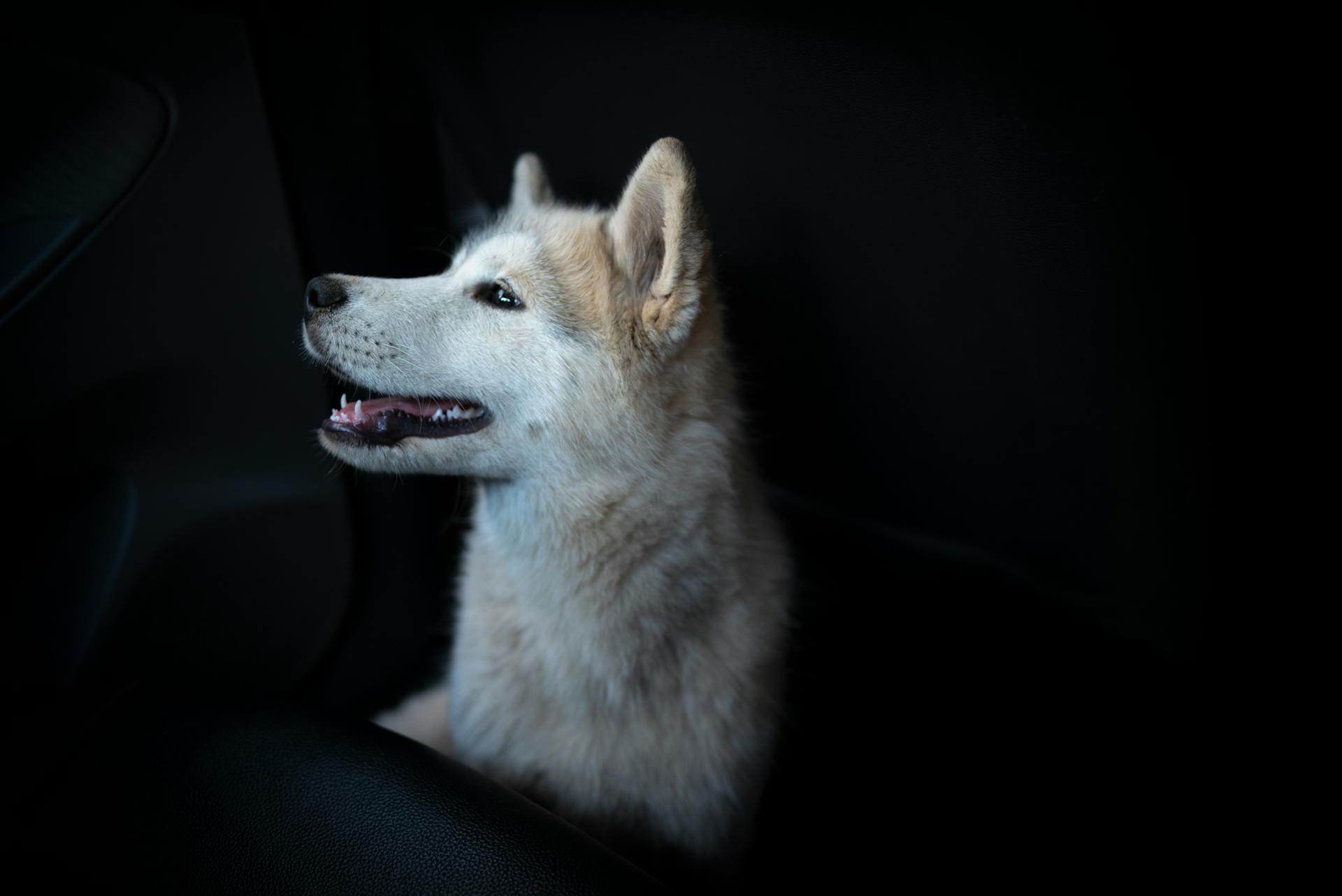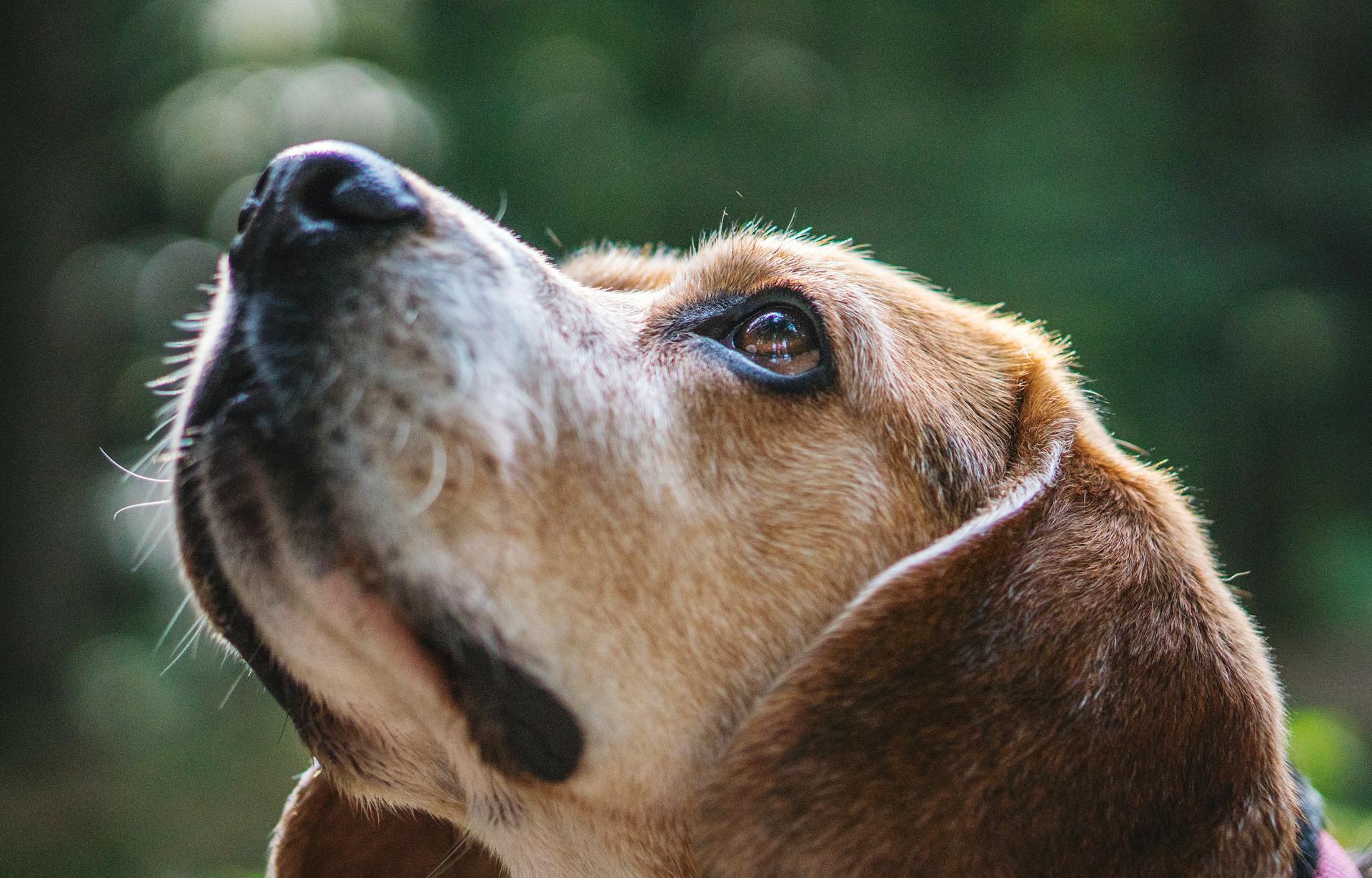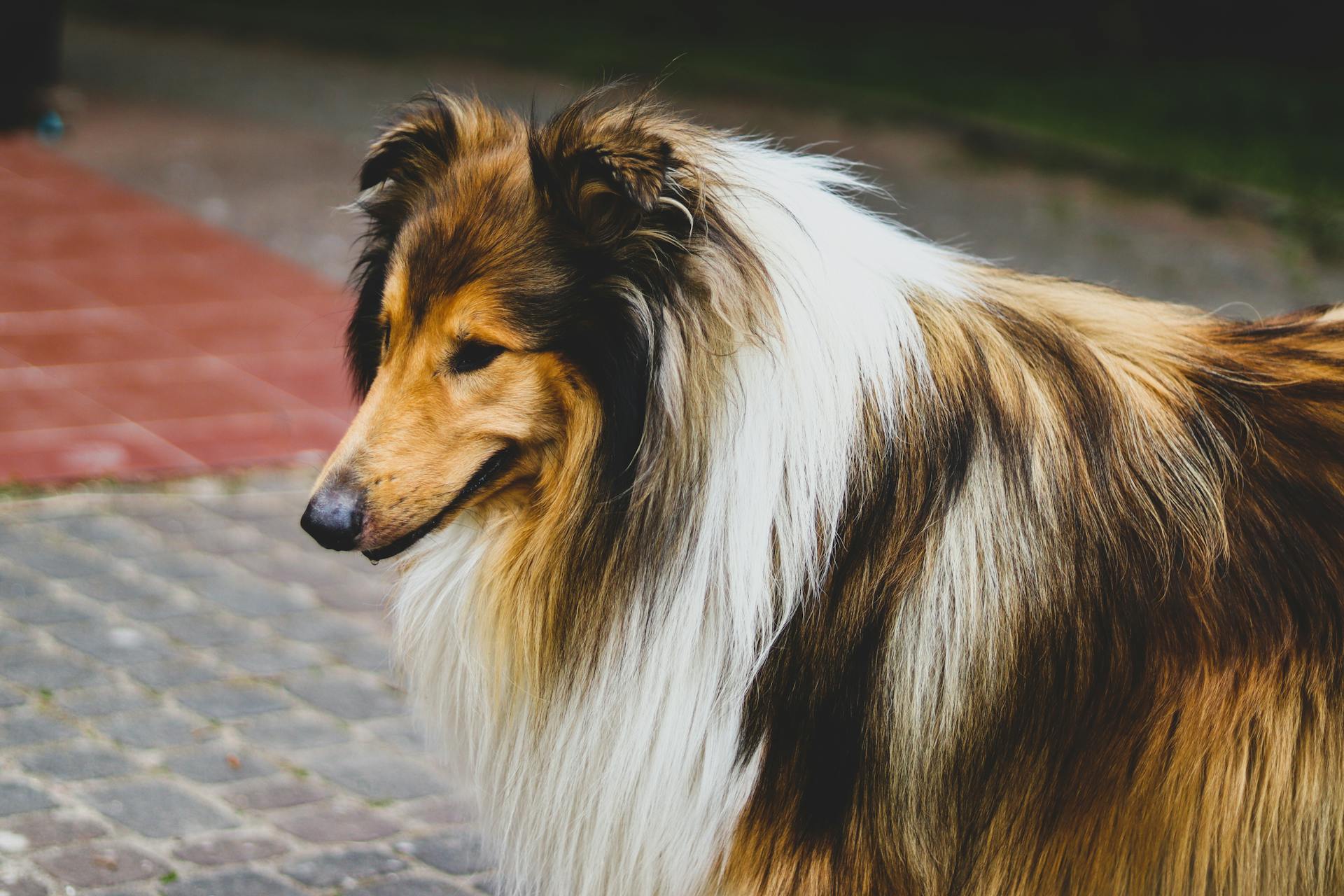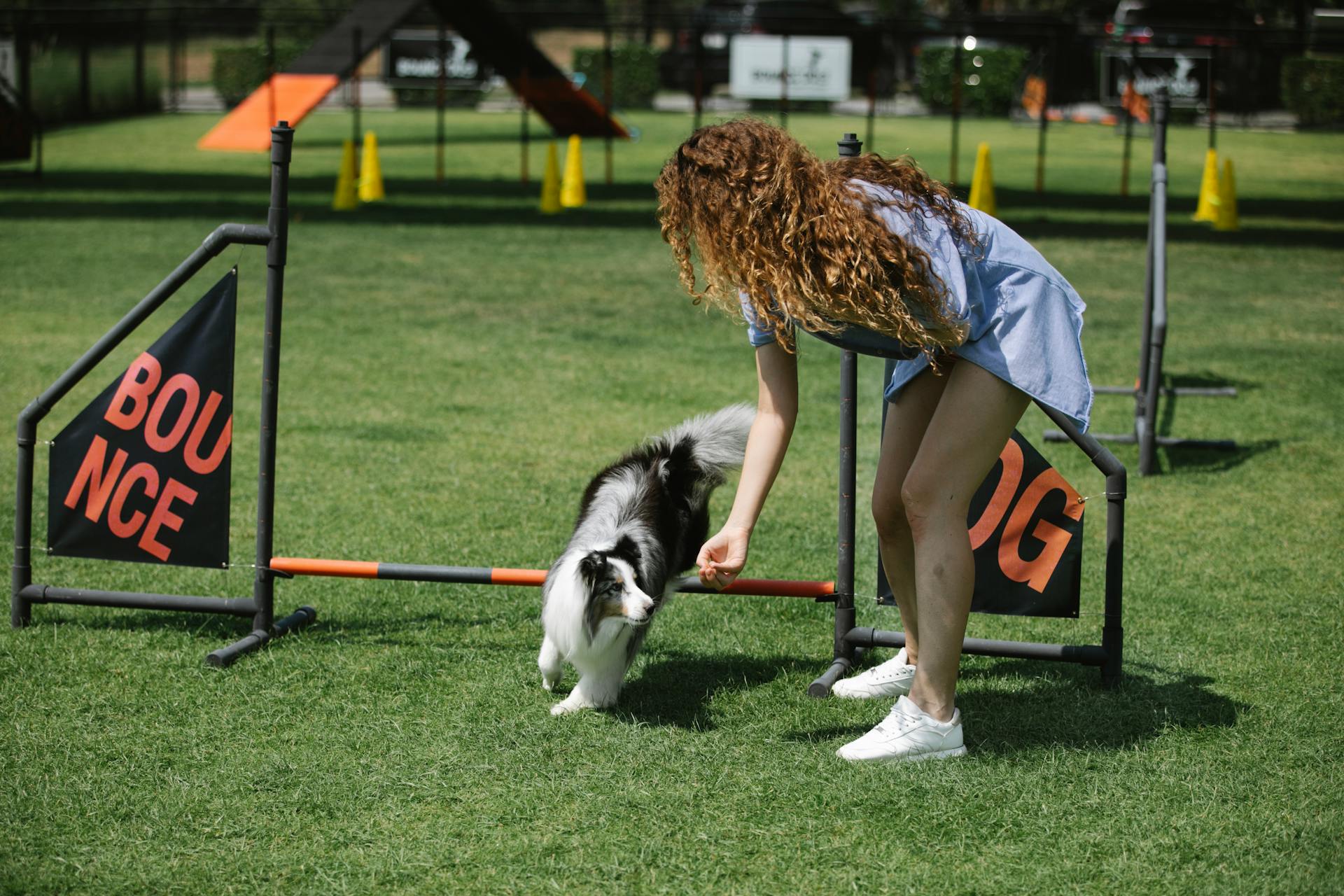
Owning a wolfdog in Florida can be a thrilling experience, but it's not all fun and games. Florida law requires wolfdog owners to obtain a Class III exotic animal permit, which can be a lengthy and expensive process.
Wolfdog ownership in Florida comes with unique challenges and limitations. In fact, Florida has a strict wolfdog ownership law that prohibits the breeding of wolfdogs.
To get a Class III permit, you'll need to provide a detailed plan for housing and caring for your wolfdog. This includes providing a secure enclosure that meets specific size and security requirements.
Florida wolfdog owners must also register their animals with the Florida Fish and Wildlife Conservation Commission. This requires providing identifying information about the wolfdog, including its breed, age, and sex.
Explore further: Wolf-dog Permit
Wolfdog Behavior and Needs
Wolfdog behavior can be unpredictable, and it's essential to understand their needs to provide a suitable home. Experts have determined that wolves and dogs share more than 99 percent of their DNA, but those few strands make a big difference.
Wolfdogs may display behaviors that are contrary to what you want in a household pet, including self-sufficiency and a tendency to find and kill prey. They may also exhibit aggressive behavior towards enemies.
Wolfdogs have a propensity towards den-building and digging, which can be destructive to your lawn and furniture. They can dig several feet down in order to escape from an enclosure, making it crucial to provide a secure and safe space.
Potential Behavior Problems
Wolfdogs may display any or all of the behaviors they've inherited from their wild ancestors, making them a challenging pet to manage.
Their DNA shares more than 99 percent with dogs, but those few extra strands can make a big difference in their behavior.
Wolfdogs are self-sufficient animals, capable of finding and killing prey, which can lead to them hunting small animals, like cats or even pets, in the home.
They also have a strong instinct to fend off enemies, which can manifest as aggression towards people or other animals.
Their natural instinct to preserve their own life can cause them to be wary of new environments, people, or situations, making them difficult to socialize.
Wolfdogs may display resource guarding, where they become possessive and protective of food, toys, or even their human family members.
This can lead to territorial behavior, where they mark their territory with urine or feces to establish a sense of ownership.
Their wild instincts can also cause them to be nocturnal, preferring to be active at night, which can disrupt the household's sleep patterns.
This can be especially challenging for families with young children or people who work non-traditional hours.
Curious to learn more? Check out: People Eating Dogs
Den-Building and Digging Tendencies
Wolfdogs have a strong instinct to dig and build dens, which can be destructive to your lawn and furniture.
They can dig several feet down, making it essential to secure your enclosure to prevent escape.
Wolf dog hybrids require a lot of space to roam and exercise, with a recommended minimum of one acre.
The cost of creating a safe and secure enclosure can be as high as $3000, not including construction costs.
Space as small as 50x50 feet is sometimes required, but this is not always sufficient for these energetic animals.
Wolfdog Ownership and Laws
In Florida, private individuals are generally not permitted to own a wolf hybrid as a pet.
Some states, like Hawaii, Illinois, and Wyoming, prohibit the ownership of wolf dogs altogether.
If you're considering owning a wolf dog, it's crucial to contact your county officials to find out what the current ownership laws are, as they vary by state and even by county.
Wolfdog ownership requires a lot of responsibility and preparation, including providing adequate containment, physical and mental stimulation, and understanding the animal's specific challenges and behaviors.
Here are some things to consider when thinking about owning a wolf dog:
- Providing adequate containment (they are jumpers and diggers)
- Providing ample physical and mental stimulation daily
- Understanding a wolf dog's specific challenges and behaviors and knowing how to manage them
- Doing extensive research on wolfdog behavior and ownership prior to adopting or buying one
Dog Ownership Laws
Dog ownership laws can be confusing, especially when it comes to wolfdogs. In the US, the USDA estimates that there are around 300,000 wolfdogs, but it's hard to know the exact number.
Some states prohibit the ownership of wolfdogs altogether, like Hawaii, Illinois, and Wyoming. Others require permits and minimum standards for things like enclosures, like North Dakota, Kentucky, and Florida. In Colorado, Oregon, and Tennessee, wolfdogs are classified as domestic animals and are allowed.
It's essential to check with your county officials to find out what the current ownership laws are if you're considering owning a wolfdog. This will help you avoid any potential issues or penalties.
Here's a breakdown of some states' laws regarding wolfdog ownership:
Remember, owning a wolfdog comes with significant responsibilities and risks, and it's crucial to be aware of the laws and regulations in your area.
Who Defines?
There's no clear definition of what a wolfdog is, and most experts use the term to describe an animal with a pure wolf in its family, no more than four or five generations back. This lack of a clear definition can lead to confusion and mislabeling.
Genetic testing is theoretically possible, but it's essentially unavailable to most individuals and not 100% accurate. This makes it difficult to prove an animal's pedigree.
Phenotyping, or having an expert evaluate an animal's physical and behavioral characteristics, remains the most accessible way to identify a wolfdog. Unfortunately, few experts are trained in phenotyping wolfdogs.
High-Level Curiosity
Wolfdogs have a high-level curiosity that can get them into trouble. They're constantly exploring their environment, which means they need to investigate everything, including cabinets, appliances, and furniture.
In the wild, this curiosity helps them learn every inch of their territory, which can be up to 1,000 square miles. In a house, it means they'll want to know what's inside every room and every object.
You might catch them trying to figure out where a TV image is coming from, or shredding barbecues, walls, and sofas in the process. This curiosity can be overwhelming for owners, but it's a natural behavior for wolfdogs.
Frequently Asked Questions
How much does wolfdog cost?
Wolfdogs typically cost between $1500 and $2000, making them a significant investment for pet owners. If you're considering bringing a wolfdog into your family, learn more about their needs and costs
Featured Images: pexels.com


